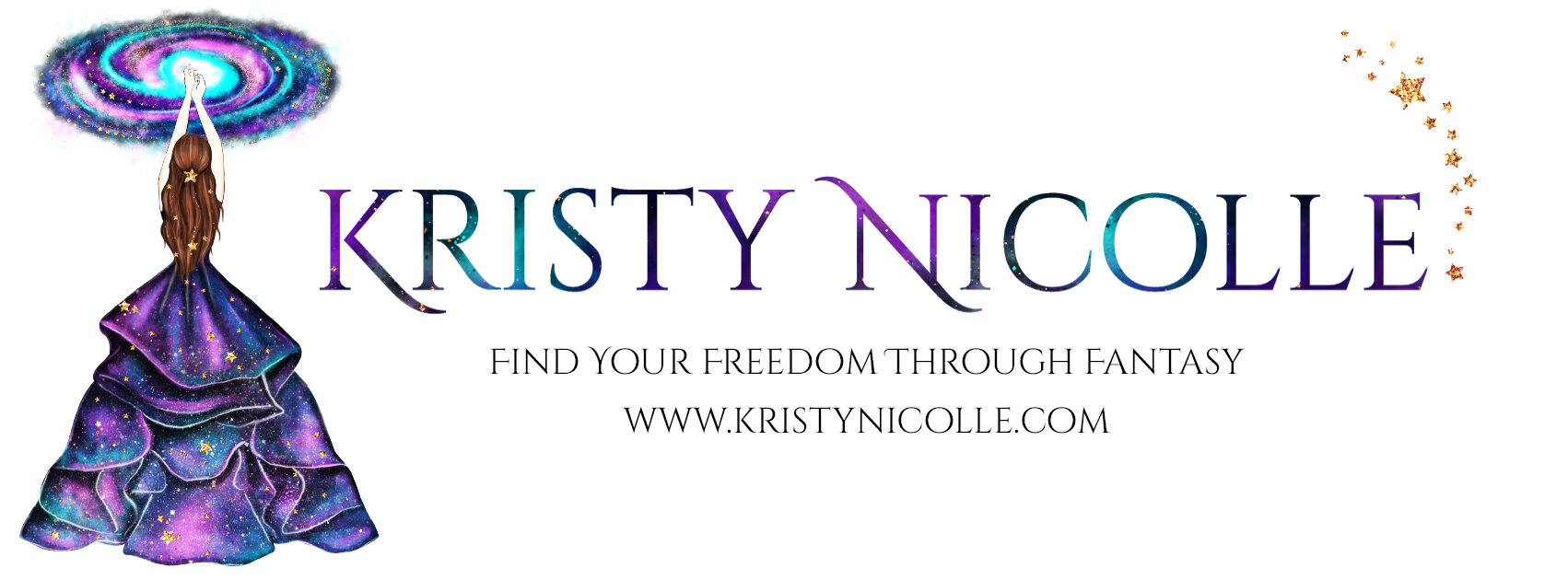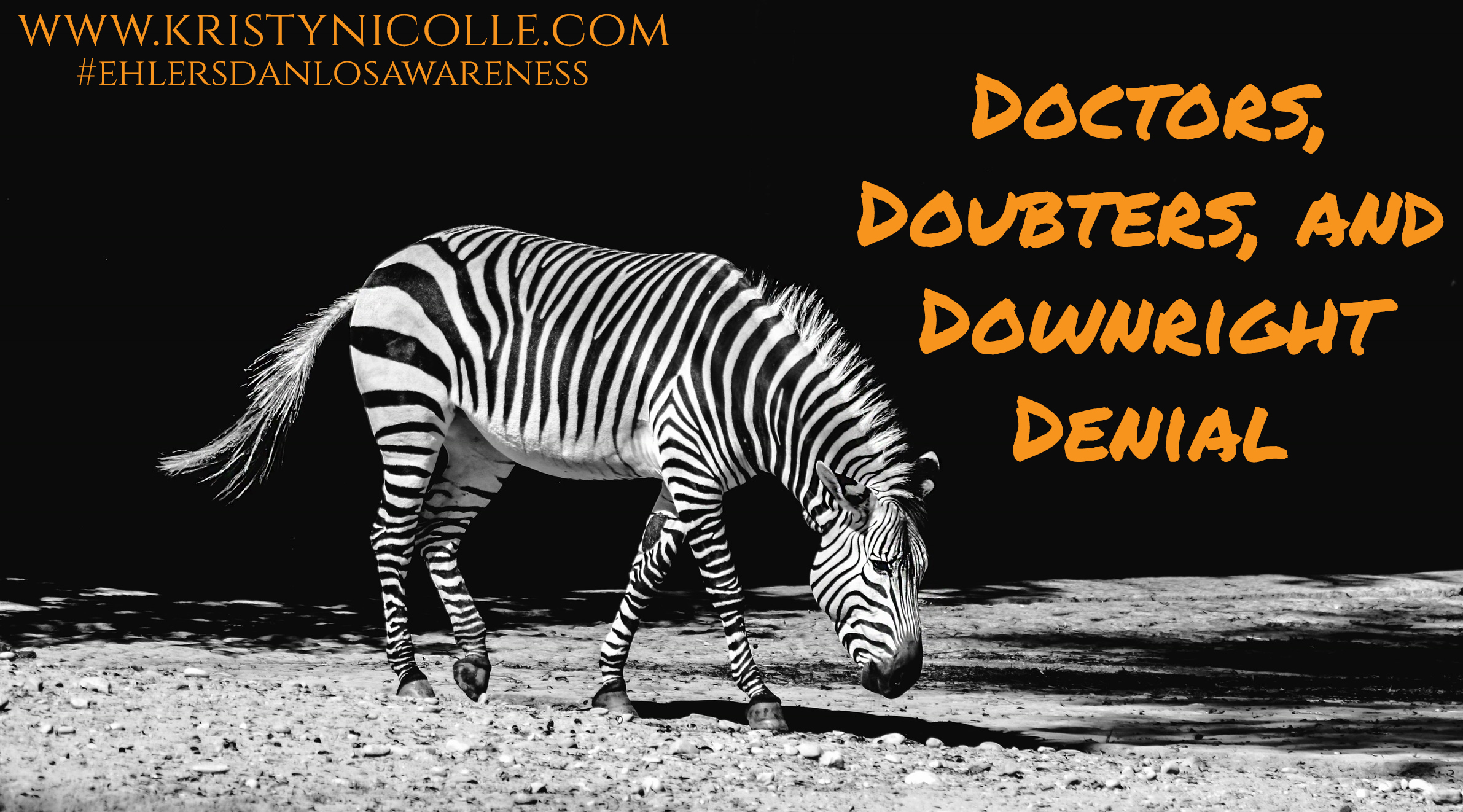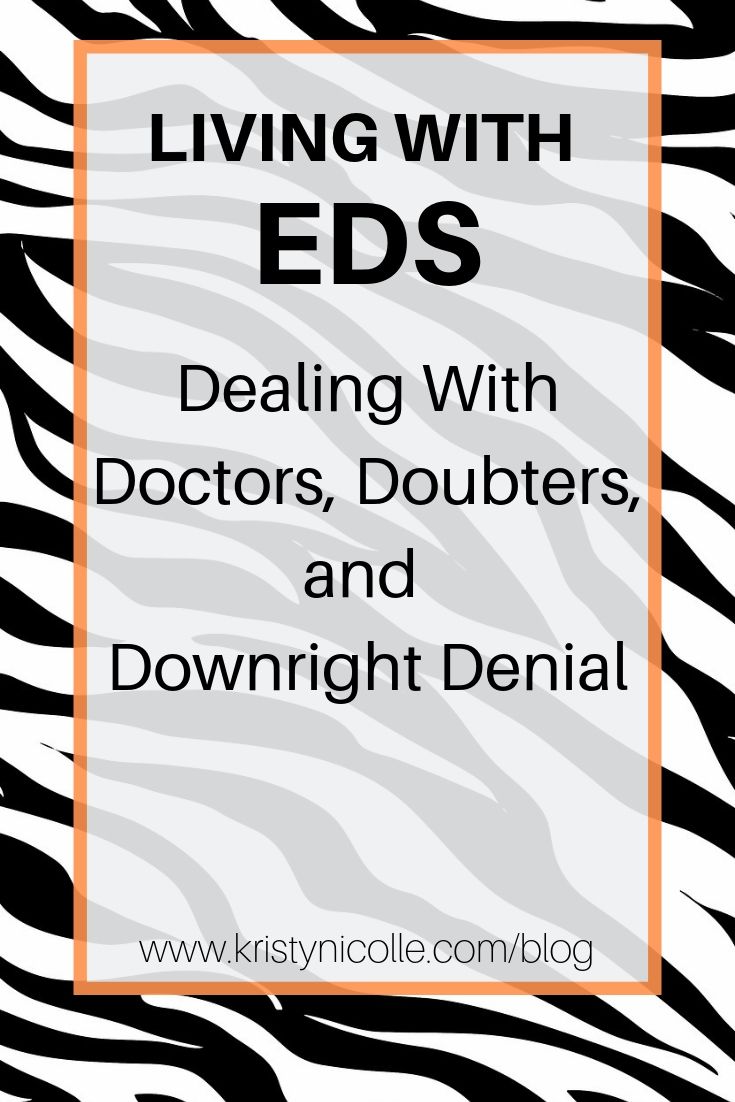Doctors, Doubters, and Downright Denial
Doctors, Doubters, and Downright Denial
By Kristy Nicolle
I think, and most of the Chronic Pain and Invisible Illness community will definitely agree with me here, that perhaps the most painful part of living with invisible diseases like Ehlers Danlos Syndome, isn’t the physical pain at all.
Instead, it’s the pain that comes with the social side of this condition that takes the biggest toll. When we hear someone has received a diagnosis like cancer, or that they’ve broken their leg, nobody seems to doubt this fact. Nobody with a soul anyway.
How many times do people with conditions like mine hear the following:
“You don’t look sick.”
“You’re too young to have that kind of problem.”
“But I saw you just yesterday, and you were fine.”
“I’ve never heard of it, have you tried yoga?”
“Why don’t you just try to be more positive?”
“Must be nice not having to work.”
The list could go on, and on, and on. Over several pages in fact.
I’ve only had this condition for four years, the first 3 of those years I was walking around thinking I had Fibromyalgia, and then 12 months ago I was re-diagnosed with Ehlers Danlos Syndrome as my umbrella condition. Over those four years, I’ve heard these numerous times, and you know what, I’ve just gotten to the point now where I have realised that when someone says one of these lines to me, that it isn’t about me at all.
So, I thought I’d write a blog post this week about how I’ve come to look at why people react this way. I mean, some people are just assholes. But when this reaction is so widespread, so common even among people who we have known for years, or even medical professionals, is it really just assholery? Or is it something deeper, and far more human?
It’s no secret that I’m the kind of person who will quite literally slam the door on you and pretend like you don’t exist when I reach a certain point (Yes, I am a seasoned pro at the INFJ door slam), but usually this is because I’ve been dealing with a relationship that is continuously pushing my boundaries, or causing me stress because the person on the other side just doesn’t understand how badly the smallest things can have a huge impact on my health, even after being told.
So, let’s dive in and take a look at this thing we call disbelief, doubt, and sometimes just downright denial, shall we?
DOCTORS:
3 years ago, after spending months going to pain clinic counselling and being put on the wrong medication by university doctors, I was just about done with the medical community. Now when I say done, I mean, flee from the sight of any hospital or doctors surgery and return with a flame thrower and a couple of cans of gasoline.
I was done. And when I say done… I mean… DONE.
These doctors had screwed around with me, my life, and my health for over 18 months, trying different medications, telling me to try yoga, to exercise, to practice mindfulness, that the pain was just in my head, that medication alone was enough to deal with my pain and that I should just basically stop complaining because it couldn’t be that bad.
There was nothing wrong with me, according to them.
It wasn’t until I moved back home and changed doctors that I started to see things from the other side.
No, I’m not sympathising with doctors, or trying to convince you that they’re all super misunderstood. Some of them are, in fact, utter cretins. But looking beyond that, my new doctor at the time (Who sadly had to give up work as he had a heart attack- that’s how dedicated this man was to his patients.) sat me down, looked me in the eye, and gave me what I felt was the first real honest to God bit of truth I’d had since being diagnosed.
This is what he said:
“I’ll be honest with you, Kristy. When a patient, especially one of your age, comes through that door with a condition like fibromyalgia, chronic fatigue, Ehlers Danlos Syndrome, Lupus etc. our hearts sink. We train for six years and then some, and the first instinct of every single person who trains and succeeds in becoming a physician is to fix the person in front of you by any means necessary. Most doctors don’t want to give the diagnosis of fibromyalgia, or Ehlers Danlos, because quite frankly it’s something we can’t cure, and know almost nothing about. Sadly, that in itself is enough to make many doctors switch off, try everything in their power to diagnose you with something else, or just feel any attempt at digging deeper is useless before trying to make you someone else’s problem.”
Again, boohoo for doctors, right? I mean, we live with this crap every day, so why should we care whether or not they feel bad for not being able to simply send us away with a prescription and fix everything?
I felt conflicted at the time too. For one thing I was extremely pissed off and angry with the entire medical community because I couldn’t get a single straight answer, but then a part of me realised that every single doctor I’d sat in front of felt that same exact frustration that was driving me crazy. They felt frustrated that their power had been taken away, that the girl in front of them was nothing but a reminder that no matter how far medicine advances, how many conferences you attend, or how many specialties you have, sometimes you just don’t have any control or ability to help someone. Sometimes, the best you can do is say… I’m sorry, but there’s nothing I can do, with that trained sympathetic look on your face.
Anyway, this isn’t the moral of this story, at least not for today. Of course, some doctors are just lazy, some of them bad with people, and some of the disillusioned by the fact they see four hundred people a week who are in crippling pain but couldn’t possibly put down the pizza or 4 litres of Pepsi a day and step on a treadmill to try take some weight off their joints.
When you’re inundated with people who are lazy, I guess sometimes you must just start to see it everywhere as a default…
Again, off topic. What I was trying to explain, a little long-windedly I admit, was that what he said made me think not only about doctors and their experiences, but also the experiences of someone close to a Spoonie, someone who to people like me, seems to become suddenly the enemy.
And so, I’ll move on to my next point.
Why do people, even people who know us and love us, doubt us?
DOUBTERS:
I’ve been thinking about this a lot, and what my doctor said to me kind of made me realise that while I’m super great at assuming that the doubt has something to do with me and is my fault, that maybe, like most of people’s behaviour, it has less to do with me and more to do with them.
I think part of this doubt that comes from those closest to us is fear that what we’re saying might actually be true. If what we’re claiming is correct, then anyone, not just us, but anyone, could have some invisible condition they’re living with that has no cure. Even if you take good care of yourself, eat right, exercise, don’t drink or smoke, sometimes it really is just the luck of the draw.
When people get cancer, or someone gets into an accident, I feel like there’s a certain thought process that occurs in the brain where we separate ourselves from the event with the hypothesis that these kinds of things happen to other people and not to us. Especially when we have lived lives that are short on trauma, tragedy, or drama, it can seem as if these terrible fates are destined for other, less fortunate individuals. The fact that there are diseases which are invisible, and manifest through a number of symptoms seen as mild that come together to become crippling, and that will plague us for the rest of our lives with no cure is therefore unthinkable.
When we ourselves are diagnosed it takes us years, sometimes decades to come to terms with what has happened, with what we have lost, and who we are now faced with becoming due to our newly imposed limits.
I know that I resisted this, I pushed myself, trying to prove that I was still who I had always been. So then, maybe the fact that those people around us doubt us isn’t so much as it is about us, but about the fact they don’t want to accept what we’re telling them. It’s easy to compartmentalise this way when it’s not happening to you. Hell, I tried to do it myself, but then I’d flare up and it would be like getting hit in the head with a reality shovel all over again.
Maybe the doubt isn’t a lack of belief in us, but a lack of belief in the idea that our friends, parents or lovers might suddenly be helpless at the hands of a disease they had never heard of and can’t see. It isn’t about us, or their lack of faith in us at all, but the fact that in calling us liars (as much as this hurts us) they’re taking back power and making us the root cause. We are something they can fix, by ending friendships or just choosing to ignore the facts and getting angry when we can no longer do what we could before.
Nobody wants to be helpless, and humans are famous for wanting the quick fix, the easy answer.
I want to believe in the good in people.
I want to believe that they aren’t always knowingly trying to be cruel, or hurtful, but are instead terrified of losing their own power, their own control. I mean, if I had the choice to tell myself this disease was all in my head and doing this would just make it go away, I’d probably take it. As it is, no amount of saying that to myself will ever make the symptoms disappear, so I’ve been forced into acceptance in a way someone who is an onlooker just isn’t.
Writing this blog post, I find myself wondering if I’m making excuses here, but then I think to myself that if I had the ability to ignore this thing and pretend it didn’t exist, I really would probably do that. Even if it meant causing myself harm in the process.
Maybe it isn’t hate or meanness then, but fear. Fear of what you cannot see, touch, smell, or taste… like the fear of ghosts that seems so widespread.
My parents are a great example of this, because for a long time, they didn’t realise how bad things were. I understood this, because I can be a drama queen, and I was living at university when I got the diagnosis. It is almost impossible for people to empathise fully until they live with you, or so it seems to me. Once I moved back home however, they saw how much my life, the everyday me and not the me having a good day and going out for coffee with them, had degraded and how there was no way I was faking.
My Dad looked at me and said; ‘I don’t know anyone who would choose to live the way you’re having to now.’ and he’s right. Nobody would choose this. Even laziness or an aversion to hard work cannot make you want to writhe in pain all night, throw up for no reason, and pass out at random. Nobody wants to spend three years going to the doctors twice a week for answers because their quality of life is just that crap that they don’t know what else to do and are constantly bursting into tears because they’re terrified. Nobody wants to stop being invited out because they can’t reliably turn up, because they can’t go dancing anymore, or even for a quiet drink at a local bar because the alcohol mixes wrong with their meds. Nobody wants to lose their independence and their ability to make their own money because they’re too sick.
Everything with these conditions is a trade-off, but it’s easy not to be able to see that from the outside looking in. Especially with social media being what it is.
I guess what I’m saying is not to sympathise with the onlooker because at the end of the day that’s not your responsibility. What I’m trying to say is that by looking at things this way you find the grace to stop blaming yourself for being a crap friend, and instead realise that’s what is happening with your social life isn’t about you at all.
You haven’t done anything wrong.
This reaction is about them and their inability to deal with your diagnosis. I guess when I look at it like this, I am a little kinder, a little more understanding, and I don’t let it bother me anymore because it took me myself 4 years to come to terms with this and I live with it every day.
I’m not saying that people aren’t assholes, because well… they are sometimes, and some people just don’t want to give any kind of empathy because it threatens their own victim identity. But what I am saying is use this angle of looking at it as a way to not let it bother you so much anymore. Let people get on with dealing with it however they are, and know that you know who you are, and what your truths are no matter what they think.
DOWNRIGHT DENIAL
I do try to give people a little room to learn to deal with my limits and to accept me nowadays, but I’m also not afraid to slam the door if I find I can’t get anywhere because some people just refuse to accept you’re telling the truth. I have ended friendships before and am sure I will do again because no matter how badly I appear to be suffering, or how obvious it is I’m telling the truth about my health, some people just don’t want to accept what I’m saying and that it affects them. Unfortunately, some friends or family will always just want to carry on as they always have regardless, but this isn’t your fault.
It’s easier now, because most of my friends have known me since after my diagnosis and honestly, I feel like by being authentic and not trying to prove my illness to people that I’m more steadily finding my tribe. There will always be some people who just don’t want to accept your life has changed and make room for the new you, the same way that when women have babies their friends don’t like the fact they can no longer spend Friday nights drinking and dancing until the early hours. This usually isn’t so much about the new mother being absent, as it is the friend being insecure that it’s their fault and lashing out.
People don’t like change, hell I don’t, but when it’s happening to you and you don’t have a choice it makes it apparent who is really your friend and who isn’t. Some people will never believe in your pain, and others, like my best friend Leeah or my partner Mark can tell when you’re having a bad day simply by looking at you with no explanation needed.
Don’t fight the downright denial of others, it isn’t worth the struggle and energy which for me is a limited resource.
You have absolutely nothing to prove to anyone.
SUMMARY
To summarise, find your people and give them a chance and time to adapt to your needs, then if they don’t it might be best to move on.
But give them a chance first.
It takes all of us time to accept and learn how to live with a new diagnosis, and friends and family onlookers are no different. Just know, that no matter what happens, nobody gets to tell you that your suffering doesn’t matter or isn’t real whether they are close friends, family, lovers or complete strangers.
Remember, the reaction of doubt and denial to your pain is never about you, it’s always about them.
Stay Strong Spoonies,
Kristy Nicolle
RELATED POSTS












When I told my Barista, Jess, that I was looking for a long series to hold my attention, she was flabbergasted to discover I’d never read the Sookie Stackhouse novels, or seen the show True Blood, which is based off them. In between customers who had come in for their daily dose of Botany and Beans magic, she got up google and started showing me some of the ovary-busting hotness that is the male half of the True Blood cast. Colour me intrigued. I found myself downloading the first book there and then, right in the coffee shop. This is my review of the first instalment, Dead Until Dark.